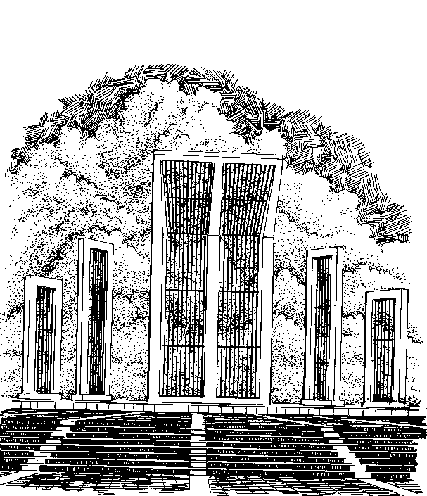BangladeshChapter 4. Government and Politics
The Shaheed Minar--monument for martyrs of the 1952 language movement, Dhaka
THE QUEST FOR REPRESENTATIVE government has been an important feature of the history of Bangladesh. The independence struggle of the eastern Bengali peoples against the British, partition from India in 1947, and secession from Pakistan in 1971 set the stage for the people of Bangladesh to create a democratic political system. The Constitution, as it was initially promulgated in 1972, embodied the democratic yearnings of the long struggle for independence and guaranteed human rights and political freedoms within a system of checks and balances similar to those existing in the British and United States governments. But later events ended these hopes. Sheikh Mujibur Rahman (Mujib), hero of the 1971 war of independence, amended the Constitution and assumed dictatorial powers. His successors, most of whom were military men who seized power during various times of trouble, also ruled through autocratic means. As a result, successive regimes established single-party systems representing military interests, with the leader wielding almost absolute power.
Yet the struggle for democracy was still alive in Bangladesh as of the late 1980s. The single-party system of the 1970s and 1980s was unable to satisfy the varied political movements and interest groups of the nation. Opposition parties--although they represented conflicting views and were as unwilling as the ruling regime to share power--remained a vital force that commanded the loyalties of a large proportion of the population.
Socialist and communist parties, centrist parties representing the policies of defunct regimes, and conservative Islamic parties-- each with a completely different vision of the path that Bangladesh should follow but united in their opposition to the rule of President Hussain Muhammad Ershad--all vied for power in the late 1980s. Their refusal to participate in parliamentary politics under Ershad, who had seized power in 1982, relegated the opposition to illegal activities and demonstrations on campuses and in the streets that periodically brought economic life to a standstill in urban areas. The ineffectiveness and confrontational position of the opposition only strengthened the regime's hold over Parliament and the civil service and allowed the military to continue its strong autocratic rule.
Remarkably, the policies of Bangladesh's autocratic military rulers have been characterized by a commitment to democratic ideals and an adherence to the Constitution. Ershad seized power in the name of the Constitution, and he sought to legitimize his position by claiming that he brought stability to the country in order to guarantee democratic freedom. One of Ershad's most significant moves toward democracy was the establishment of a system of local elections that allowed voters to choose members of local representative councils. In the short term, this democratic reform allowed local elites to control government patronage, and it also made them docile supporters of the regime. Nevertheless, by the late 1980s the local councils had become training grounds for new political leaders and forums for democratic competition throughout the nation.
Bangladesh has pursued a neutralist policy in international relations in a continuing effort to secure economic aid from every possible foreign source. Bangladesh in 1988 was one of the few countries in the world on good terms with both the United States and the Soviet Union and their allies and with China, the Islamic world, and most Third World nations. Bangladesh has played an active role in the United Nations (UN), the Nonaligned Movement, and other international groupings, and it was the driving force behind the establishment of the South Asian Association for Regional Cooperation, which offered promise for economic cooperation. Bangladesh was neutral, but it was forceful on a number of international issues. The Cambodian, Palestinian, and South African issues have elicited strong stands from Dhaka, and complicated bilateral problems with India have invoked intense displays of hostility and national pride among Bangladeshis in the years since independence.

